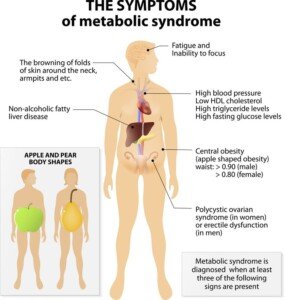Metabolic syndrome is no picnic but it’s highly treatable. You may have metabolic syndrome and not even know it.
It is dangerous. It comes with fatigue, slowed metabolism and fat gain, plus blood sugar issues that can lead to type 2 diabetes.
Your doctor can tell you if you have metabolic syndrome or are headed in that direction.
Of course, if you’re overweight, don’t exercise and eat a lot of processed foods — and you feel rundown or often fatigued — you wouldn’t exactly be in left field to suspect metabolic syndrome.
Best Ways to Fight Metabolic Syndrome
One great way is the Mediterranean diet.
“The Mediterranean diet is high in fruits, vegetables, fish, nuts and seeds, and olive oil,” says Julie Cunningham, MPH, RD, LDN, registered dietitian and certified diabetes educator.
“Thus, it contains lots of antioxidants, omega-3 fatty acids and fiber, which are beneficial for the prevention of different cancers as well as heart disease.”
Falsely Believing You’re on the Mediterranean Diet
Many people believe they are on the Mediterranean diet, when in fact, their eating habits are far from it.
Olive oil in your cupboard, in and of itself, does not mean you’re truly on the Mediterranean diet!
A very large study in Journal of the American College of Cardiology (March 15, 2011) endorses the Mediterranean diet as a way to fight off metabolic syndrome.
What exactly is metabolic syndrome?
Metabolic syndrome is the catch-all term given to having a cluster of conditions that significantly raise risk of heart disease and type 2 diabetes.
The cluster of conditions are: insulin resistance, poor cholesterol profile, high blood pressure, and a higher than normal risk for developing blood clots.
As just mentioned, metabolic syndrome is associated with obesity, as well as just having excess belly fat.

Shutterstock/Disignua
Who gets metabolic syndrome?
A blaring risk factor for metabolic syndrome is lack of exercise, or inadequate exercise.
“People with metabolic syndrome benefit from regular cardiovascular exercise (such as walking 30 minutes five days per week), mild weight loss if they are overweight, and a diet that is high in omega-3 fatty acids (olive oil, fatty fish, nuts and seeds).” explains Cunningham.
Other lifestyle habits put you at risk for metabolic syndrome:
- Progressive weight gain
- Smoking
- Highly processed-carbohydrate diet, and though metabolic syndrome can cause weight gain, being obese is the greatest risk factor.
The Study Report
The JACC report is an analysis of 50 studies involving the Mediterranean diet, encompassing about 500,000 participants.
The Mediterranean diet positively impacts problems like excessive waist circumference, “bad” cholesterol and triglyceride levels, blood pressure and glucose (blood sugar) metabolism.
“The prevalence of the metabolic syndrome is increasing rapidly throughout the world, in parallel with the increasing incidence of diabetes and obesity, and now considered a major public health problem,” says lead researcher Demosthenes Panagiotakos, PhD, in the paper.
Mediterranean diet food pyramids vary.
But the variation is minimal. Whole grain cereals are also permitted, and some pyramids show daily consumption of olive oil or olives.
The Mediterranean diet forbids processed foods as staples other than the cereals, breads and pastas.
“Our results add to the existing knowledge, and further demonstrate the protective role and the significance that lifestyle factors, and mainly dietary habits, have when it comes to the development and progression of the metabolic syndrome,” says the JACC paper.











































